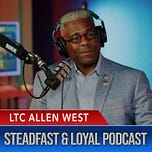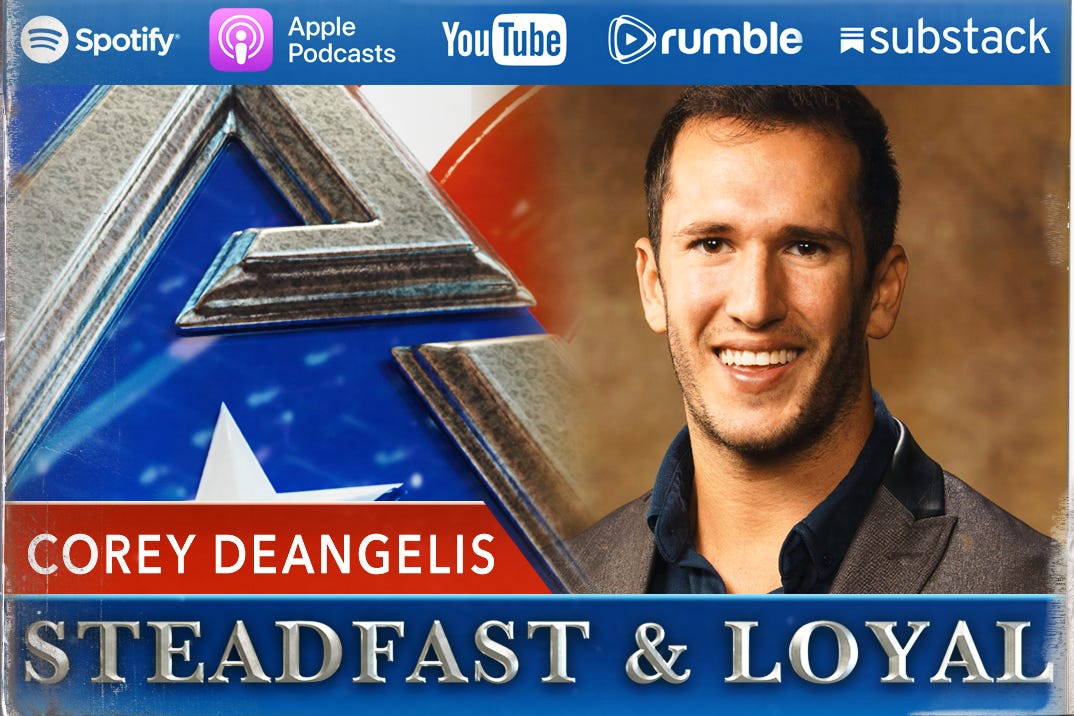Also available on all major podcast platforms.
AUTO-GENERATED TRANSCRIPT:
00:00:00 [ALLEN WEST]
Hey, greetings, everyone. Lieutenant Colonel Allen West and welcome to Steadfast and Loyal.
[MUSIC]
00:00:52 [ALLEN WEST]
Hey, folks. Welcome back to Steadfast and Loyal. Without a doubt, education, freedom and educational policy is going to be one of the big issues when we look around, especially in our inner city communities.
And you see young people that cannot do math or reading at grade level, that does not set them up for success. And it's interesting that we just had this decision from the Supreme Court on affirmative action.
Well, we need to get back to teaching our kids the right way because that's how you open up the doors of the equality of opportunity.
So here to talk to us on this issue of school choice, educational freedom, parental choices, Corey de Angelis, Corey is a senior fellow at the American Federation for Children. He is also the executive director at the Educational Freedom Institute and Angel, an adjunct scholar at the Cato Institute, a senior fellow at Reason Foundation, and a board member at Liberty Justice Center. Corey received his PhD in education policy from the University of Arkansas, Whoop Sui. He holds a BA and an MA in economics from the University of Texas at San Antonio.
Corey, thanks so much for joining us here at Steadfast and Loyal. You know, I think that this is going to be one of the preeminent issues going into the 2024 election. And I believe what elevated education as an issue was out of COVID when all of a sudden parents looked down and said, what is going on because the kids and the parents were locked in the house together.
And then you have the buffoon Terry McAuliffe in Virginia who said that parents do not have a right and deciding what their children are being taught. And that activated mothers and fathers to get out and be involved in school board meetings. How do you see this issue continue to play out?
00:02:44 [COREY DEANGELIS]
Yeah, I think you're absolutely right.
The teachers unions overplayed their hand and awakened the sleeping giant, which happens to be parents who just want more of a say in their own kids education.
I mean, you had the teachers unions threatening safety strikes in 2020. Yeah. You had them deleting tweets saying that the push to reopen schools is rooted in sexism, racism and misogyny.
You had the Chicago Teachers Union doing interpretive dance.
Videos about how it was not safe enough to go back to work, even though their board member was in vacationing in Puerto Rico in person while railing against going back to work.
I mean, it just became so obvious the hypocrisy in front of everybody's eyes for several years, but I think it's deeper than that. It's parents like you mentioned started to see that there was another dimension of school quality that is much more important, arguably more important than anything that could be captured by a standardized test, which is whether the school's curriculum aligns with families, values, kids, families don't want to send their kids to institutions where they feel like they're being brainwashed for 13 years, and to hate their parents and to hate their country.
And so these parents, a lot of them who had their kids in a rated public schools started to say, hold on a second here. I'm gonna push back at the school board meetings. And I'm going to make my voice heard. And you know what they found out when they did that? They don't want to be like the the school boards don't want to listen. They're going to label them as domestic terrorists for pushing back at the school board meetings.
I mean, the Biden administration colluded with the National School Boards Association to send a letter to the UN, to the DOJ to investigate parents. They did create an FBI threat tag for parents at school board meetings as domestic terrorists. No, the better answer is from the bottom up. School choice allowing families to vote with their feet to schools that are aligned with their values.
That creates more competition for the public schools to actually listen to parents instead of labeling them as terrorists. And the study after study has shown 26 to 29 studies find that private school choice competition. Allowing the money to follow the child is a rising tide that lifts all boats, leads to better outcomes in the public schools, and now we've had nine states in two years, all states controlled by the Republican Party in both.
No picking winners and losers. Everybody's eligible, regardless of income background, regardless of ZIP code. You can take your kids education dollars to a public school if you want. If you like your public school. If you can keep your public school, unlike with your doctor. But if not, you can take that money to a private school charter school or home school. And I think this is going to continue because it's the right thing to do.
The polling has shown that it's it's surged in recent times, with 71% of support. American supporting school choice in June of 2023, up seven points since April of 2020. And it's become a political winner, too, and it's become a GOP litmus test issue. Red states are going all in on school choice.
00:05:46 [ALLEN WEST]
Well, it's interesting because when you go back and look at Ron de Santis's first run at the gubernatorial election down in Florida, where he barely won, I mean less than 1% against the former mayor there in in Tallahassee, it was the educational freedom.
It was the school choice that made the difference in the cross tabs afterwards. The exit polls showed that. There were single Black mothers who voted for Ron DeSantis because he said I will not relegate your child to a failed public school.
So let's talk about some of these states. Because why is it then, you know, you and I here in Texas and you know what I'm about to ask you?
We've got a Republican legislature, we got a Republican governor who continues to say that school choice is a priority for him. But we just finished the legislative session and and it did not get any type of attention.
00:06:34 [COREY DEANGELIS]
That it's because the house has historically had too many rhinos that have been bought off by HB and the teachers unions.
To oppose educational freedom and their main so look, the Senate in Texas in 2017, they passed an education savings account before it was cool to do so before the whole battles about CRT and politically divisive concepts in the classroom before COVID Texas Senate, they passed what I what I want to say is I believe it was Universal Education savings account. And it was blocked by the house then as well.
And then in the regular session, the house was the Chamber again to block school choice. The argument that they put forward is totally ridiculous. They say that, well, we have rural areas in Texas and because we have rural areas, that gives us an excuse to vote against our party platform issue and to and to vote to trap kids in failing government schools, even though Texas in 2022 and their March the March primaries, they put it school choice on the ballot Proposition 9.
Yeah, 88% of Texas Republican primary voters supporting school choice. And that was up 9 percentage points since they last did it in 2018.
So the Texas Republicans have surged in support of school choice. It's always been monumental support, but it's become a breaking point recently where I think legislators are gonna have to react.
And during the special session, that's expected, that's going to be called by Governor Greg Abbott, who's made it an emergency item this year. And he's also campaigned across the state and pushed in dozens of cities to support education, freedom and to to call for education savings accounts to be passed. He's calling for a special session that's expected to come. Sometime soon the the fake Republicans in the Texas House are going to have primary candidates breathing down their necks.
I hope they just do the right thing and vote for parents to support education freedom. But the argument that they lay out is that one they'll say because I'm in a rural area, the public school is the only option, they'll say.
But then in the next sentence, in the next breath with a straight face, they'll try to tell you that this will decimate and destroy our fantastic rural public schools.
Well, you know what? If they're so fantastic, you should have nothing to worry about.
But then two. If the public school is the only option and public schools are funded based on how many people are the kids are there, you should be the last person making this argument.
No one's going to leave if it's. If it's true that you only have public schools in your area well.
You should be the last person saying that's going to defund your schools, because if the if the kids aren't going to go anywhere else.
The worst case scenario for you is that nothing. Changes, but the reality is you pull voters in Texas, University of Houston, University of Texas, Austin. They've split it down between rural, suburban and urban. And if anything, the rural voters are most supportive of school choice policies, including vouchers, including education savings accounts.
The UT Austin polling found a 16% percentage point jump in support since June of 2017 to June of 2023.
So there's a huge shift in Texas legislators should respond to that shift, even though it's it's always been popular.
It's just so enormously popular now that we've reached a breaking point that Texas needs to get it done this year, especially with the governor on board the Senate easily passing the Bill 18 to 13 in the regular session.
I think the the temperature in the capital is that the House needs to do something. Hopefully they go all in too and do universal school choice. But anything would be a victory if it includes the mass, the vast majority of Texas families.
00:10:22 [ALLEN WEST]
Yeah, because in a way, you kind of get that sensing that, you know, Governor Abbott says that I'm all in for this school choice thing.
But I got my little henchman over here and the speaker of the House of the Texas House and you know, he's the reason why we can't get it done to me.
If you're the governor, you should be able to look at this figure house that you know, point the finger.
You, you're going to make this happen, you're going to get it done.
Now, one of the concerns and maybe you can help us understand this, a lot of parents are saying we don't want the government intervention to follow the money. Is that a concern that you have?
00:10:55 [COREY DEANGELIS]
Yeah, I have a couple of responses to that and I actually got into school choice as a liberal with libertarian tendencies where I don't want government intervention in the private sector.
And my quick response to that is this is the very definition of making perfect the enemy of the good. The government can already regulate private and home education.
They have historically and in Oregon in 1922, in Oregon, they outlawed private education. You had to go to the government school to get your kids indoctrinated with the leftist ideology at the time. Thankfully, in 1925, the US Supreme Court and Pierce versus Society of Sisters struck down that bigoted law where the court famously said, thankfully, that the child is not the mere creature of the state.
Only if Joe Biden could figure that out. The kids don't belong to the government.mThe child is not the mere creature of the state.
So we have Supreme Court precedent on that, but that wasn't because of a school choice program that they that they called it in home and private education. It was because they had authoritarian people, politicians who are authoritarian, authoritarian tendencies in office, who passed policies to restrict the individual liberties of of parents and to attack parental rights.
And so with school choice, you you strike against the likelihood of those things happening in at least three ways. One you have fewer kids in the government school system being indoctrinated to like big government socialism, those kids might vote to regulate home schooling tomorrow if they if we don't have school choice.
So this is an exit. It's a it's a opening, the floodgates allowing for some exit options. To maybe have kids be educated in religious schools or other more conservative schools, but then two, when you have more people using private and home education through school choice politics is all about organized special interest, right? And coalitions. Well, if you have more people benefiting from the program, well now you.
You can fight against those future calls for regulation and the best way to do so is if you have a lot of people on your side fighting against any authoritarian overreach, and I think this is part of the Florida story that you pointed out, that DeSantis barely win won in 20/20/18 in this first memorial race.
00:13:10 [ALLEN WEST]
Yeah, I guess Angie Gilliam.
00:13:11 [COREY DEANGELIS]
Because of school choice moms and why? Because partially because Florida already had a tax credit scholarship program for low income.
Families disproportionately were minority families. Disproportionately were lower income families. I think the average household income for families using that program was only about $30,000 a year, and those same parents came out in support of DeSantis because his opponent Gilliam, didn't support that program.
And so that really school choice can turn voters into single issue voters. And who would have historically not voted for the Republicans who are more likely to embrace freedom of expression and well, that now you have a political center that can turn into a a safeguard against authoritarian overreach in the future, and that worked for Florida and Florida. You have to santis Fast forward to 20221 by 20.
Just imagine if Gilliam was in charge of Florida, it would have been closed down. You wouldn't have had as much school choice. It would have been totally different and that would have affected the other states because a lot of states look to Florida and say and and they were able to say, well, they open, they were OK, well, maybe we'll open too.
And so we might have been locked down as a country. Even longer than we were. And then three when when more people use school choice and you get a bigger coalition using it as well. The concept becomes more mainstream. And if the concept is more mainstream, the rest of society is less likely to see that this is a that this is some icky thing that only a few people are doing, and therefore we got a call to regulate it.
So the more that the rest of society is OK with this idea of private and home education, that should reduce the chances of government overreach in the future.
Again, this isn't a silver bullet. But is the best solution that we have at the moment and was as the great economist Thomas Sowell once famously said, there are no solutions. There are only trade-offs.
And the people who are fear mongering about school choice, they're looking at one potential cost of school choice that could happen in the future while ignoring the guaranteed monumental cost of cementing the status quo.
And if school choice was really a ploy to have the left take over private education, why the heck are all the Democrats voting against it? Why are the teachers unions who are who control the Democratic Party, so against school choice? If if it's really just a plot to to infiltrate leftist values into private schools, that that's not what that's not. That's not the game of school choice. And my last thing I'll say about it is in states like Texas and others that have passed these monumental policies. Arizona being one of the first.
They have explicit language in the bill saying that the if you accept the funding, you won't be a state actor, so you won't be a a government school. You won't turn into a government school and that the government cannot control the creed curriculum admissions policy.
These and and and otherwise of the private schools, so there's not all school choice bills are created equal on this front.
And one way that that, that comes to light is understanding that you should have anti regulation language in the bill as well. So instead of pushing against school choice. With fear mongering.
I suggest those who are concerned about it push for amendments. If the bill doesn't have that, that important language included, and I'm at American Federation for Children. My organization and the Institute for Justice as well, we both have in our model legislation to have anti regulation language.
00:16:39 [ALLEN WEST]
You know, and also I would say education policy and that issue was important in the Virginia election because all of a sudden you get a clean sweep of the governor, Lieutenant governor and attorney general.
Let's also focus on the impact of these superintendents that they have out there and some of the the school board policy, I think filing we have awakened to realize how important school boards are but also you see a lot I think here in Texas the superintendents don't want to lose their, quote, UN quote fiefdoms out there.
00:17:10 [COREY DEANGELIS]
That's right.
00:17:10 [ALLEN WEST]
And so they're standing up against this school choice. How do we combat that education administrative state?
00:17:18 [COREY DEANGELIS]
I mean, look, in Texas, I've listed the Superintendent salaries. You have at least a handful of them making more than the President of the United States over $400,000 a year.
So you know, yeah, I mean superintendents are in all states. So I don't think they're the only force at play here that's blocking it in, in, in excess, but it is true that you know, they they have superintendents, unions, they have administrators, unions, they have teachers unions.
So it's all these employees unions caring about the interests, interests of adults over the well-being of children, and I think shining a light on that fact helps people get on the side of the parents and the children. And it helps legislators as well to see what's really going on. Just to just showcase the lies that are being spread by by the defenders of the status quo, I mean the main argument they'll make is that this will destroy the public schools and one you can point to all the evidence shows the opposite. It makes them better. They just don't want to compete.
They don't want to have to up their game in response to the competition. That's what's really going on. So showing all that evidence showing that it's popular with voters showing how there's been a huge shift showing that other states have done this and other states haven't destroyed their public education system, and also going to show them that we support public education too.
If you like your public school again, you can keep your public school and and actually shown in the evidence, so just pointing out where the interests lie, and it is really important and and at the end of the day, politicians do respond to logic but they more importantly respond to power dynamics, and at the end of the day.
Whenever a bill comes up and the politicians hearing all from one side getting a flood of emails because the Superintendent said and emails to all their employees and says Ohh you need to vote for this or you need to to e-mail your legislators to vote against the school choice policy because you're not gonna have a job next year.
All the fear mongering that they employ. Boy parents, they're not full time advocates usually right? They they have to raise their kids. They have the job of their own to do. And so I think what's changed the past couple of years is parents have kind of become an interest group themselves. You have Moms for Liberty, for example, and they're saying that it's so important.
00:19:33 [ALLEN WEST]
But, but they're a hate group. Moms for Liberty is a hate group . . .
00:19:35 [COREY DEANGELIS]
Ohh yeah, that just goes to show you how threatened the status quo is right now.
00:19:35 [ALLEN WEST]
Group. Now you know.
00:19:41 [COREY DEANGELIS]
They are losing control over the minds of other peoples child. Children and that's causing them to lose their minds because they truly see the government school system as a way to raise other people's kids.
That is totally backwards. That's why you have Joe Biden tweeting out that there's no such thing as as other people's kids, it's societies, kids, or whatever the actual quote was. It's total communist garbage.
And the vast majority of parents and the overall electorate don't buy it for a second. It's only a a very radical left group that actually believes kids belong to the government, but then they try to to to paint groups like Monster Liberty that are threatening their power structure. Or as hate groups? That's all they have is to label everything they don't like as an evil thing. Instead of grappling with the logic of the arguments, I think if we continue to take the high ground, grapple with the logic of the arguments. We have logic on our side with school choice. We have morality on our side with school choice, and now we also have political power on our side with school choice because parents are fed up with it.
They care about their kids more than anybody else, particularly more than bureaucrats sitting in offices hundreds of miles away, and they've had enough.
They've stood up, they've gone to the school board meetings, but they're going to the ballot box too. I mean, in in in 2022, in the midterms. A lot of people were talking about the red wave. There wasn't a red wave that we were expecting. There wasn't a blue wave, obviously, but there was a school choice wave yeah, 76% of the candidates supported by my organization, the American Federation for Children and our state affiliates won their races in 2020 and we didn't just plan the easy ones. We targeted 69 incumbents and state legislatures and took out 40 of them.
That's the hardest thing to do in politics. To unseat a sitting legislature. And we took out 40 of 69 and then also you don't have to take my word for it. You can look in The New Yorker magazine right after the midterms.
The Liberal author lamented that education freedom candidates fared depressingly well in the midterm.
00:21:50 [ALLEN WEST]
That tells you something.
00:21:50 [COREY DEANGELIS]
They're so that.
00:21:52 [ALLEN WEST]
You know it's interesting because one of the things the military teaches you, you always find the gaps. You always find the the openings to exploit your your adversary with and and I think something happened in North Carolina that, you know, I don't believe we have exploited to the fullest. When you have a Republican legislature that passed a school. Would you have a Democratic governor that comes out and declares a state of emergency because of still absolutely mind blowing?
We should have been hammering this to say that Democrats feel it's a state of emergency for your child to have access to a quality education they would rather have your child be locked into these schools where they cannot get out. They rather have your child not able to read or do math at grade level, you know where is that concerted? Maybe you know your federation will take it up that concerted message. Because I got to tell you, most times Corey on our side, we suck at messaging. We can have the high ground, we can have all the truth, all the facts. We don't message it properly.
How can we message something like this to show that the Democrats don't care about the education of your child?
00:23:06 [COREY DEANGELIS]
Yeah, I'll just start out by saying Roy Cooper, the Democratic governor of North Carolina is a freaking hypocrite. He sent his own kid to private school, and now he fights as hard as possible. And what? Where was the state of emergency over the failing government schools and the closed government schools for for quite a while, you'd think you'd call a state of emergency over that. But no, he's more worried about his campaign contributors, the teachers unions. It's a state of emergency for their power structure. It's it's not a state of emergency for children and I think that's really important to point out.
But look, as far as messaging, well, I think first of all, in North Carolina, they're going to get to universal school choice because Trisha Cotham switched to left the Democrat Party. Became a Republican, and now both Chambers in North Carolina have a enough votes precisely enough votes to override.
The hypocrite, Governor Roy Cooper's expected veto of school choice policy, so they've all signed on in both chambers and needed every single one of them.
Yeah, it became a litmus test issue in North Carolina for their Republicans, even a Democrat who who switched parties is voting for it. You think Texas Republicans, if they actually followed what their voters wanted?
In Republican areas, they'd be able to get universal school choice done as well, but so I think it's going to get across the finish line in North Carolina.
And then as far as messaging, I think it's important to one highlight the political victories we've we've really tried to message on the logic of school choice and we've won on that message. We know we're doing the right thing. We know there's no good arguments against it. It's all a bunch of fear mongering BS that doesn't stand up to the actual evidence. So we've won the logical battle. We need to convince legislators that this is a political winner too, because again, politicians respond to polling, they respond to organized interest. And that's just the reality of the world we we live in, whether we like it or not.
So I think that messaging is important and then also. I've kind of I think, myself I I don't wanna toot my own horn too much, but I've tried to make a concerted effort to change how we talk about the idea of school choice. Because when you say school choice, I mean you get everybody who's already with you because they know they support it. Yeah, but it's not very transparent because like, what does that actually mean, right, is it? Does it mean that, well, I can choose a school and pay for it?,It's like, OK, yeah, I I have that. Or does it? So it it gets confusing really quickly to a lot of people who are in politics. And then it has been demonized by people who don't like it. So you're not going to be able to convince people who are already so hard dead set against it if you say the word school choice. Whereas the what the term I have introduced is something called funding students instead of systems fund students, not systems, and that is beneficial in a couple ways.
One, it's more transparent. It's it's the idea of the funding following the student. It's and how can you argue with the funding following the student? How can you if you want to argue with me when I say fund students, not systems. You're in a weird predicament where you're trying to explain why we should fund the system and not the student.
And it really goes to show you're not for the kids, you're for the buildings and the government institution as opposed to the family. And so that rhetorical technique puts the other side on defense. And if you're explaining you're losing and then analogies are important in politics too, because you got to communicate in sound bites.
00:26:22 [ALLEN WEST]
Got to do it.
00:26:29 [COREY DEANGELIS]
And when I talk about funding students instead of systems, that idea is already at play with everything else, with pre-K with the head start program. The funding follows the student. Parents can choose different private pre-K providers, even religious ones with higher education.
Democrats support Pell grants, right? And those are vouchers that you can use at public or private, religious or non religious university. So you can point out their logical and consistency when they say things like public funds for public schools. It's like, OK, but you support taxpayer dollars public funds for private colleges and pre kates and grocery stores, food stamps, and snap. You can use that at HEB or Walmart. It doesn't have to go to a residentially assigned government provider of groceries where you get government cheese, thankfully.
And so when you can point out all of these Medicaid dollars, you can use Medicaid dollars at a private, even religious hospital if you want. Section 8 housing vouchers can be used at private providers of housing. I mean, it's you.
The list goes on and on and on. That again, the Democrats support all these other things, but then they don't support it. They support for for college pre-K they don't support it for the in the in between years of K to 12 education and it all has to do with power dynamics.
Yeah, choice is the norm for higher Ed and pre-K, but choice threatens and entrenched special interest that superintendents, the administrators, the teachers unions, and they fight as hard as possible against any change to the status quo and that just really it blows the mind of a lot of Democrats who haven't thought about it that way.
And it really makes sense that this is about power dynamics. It's not about logic and so some, at least independents start to sway towards the parents. We saw this with Glenn Younkin in Virginia, where a state that went ten points to Biden, and in 2020, the year before the election in 2021, it went six points to Glenn Younkin with education voters. And that those type of voters were the #2, that was the number two issue in the election ended up winning by two points overall around that number and it was on the issue of parental rights and that's another point of messaging that instead of just talking about it in terms of school choice or funding students as opposed to systems using the umbrella term of parental rights, I mean, school choice is part of it.
00:28:54 [ALLEN WEST]
Of course.
00:28:56 [COREY DEANGELIS]
Having more of a say at the school board meeting as part of it. And then that exposed. This is the lefts opposition to parents in general and then having a right over there directing their kids lives and their kids education and most people aren't communists who think kids belong to the government.
They think that parents are in the best position to make those decisions, so when you get them to slip up on the left like Terry McAuliffe did, which, you know, he let the mask slip.
This this is a great political technique and and messaging technique that I think all Republicans should follow the the Glenn Younkin blueprint for political success and talk about things in, in terms of parental rights.
00:29:38 [ALLEN WEST]
Well, without a doubt, what you have to do, you don't win on defense. You have to put them on defense. You have to go on offense and you have to be relentless and that's why the messaging is so important. That's why I like what you say, fund the students, not the system. And and I'll leave you with this, and you can choose to use it if you want. But when the left talks about how math is racist. You should make a meme or some type of message out there that says the left thinks that math is racist.
Ask these women and you should show those women who were featured in the movie Hidden Figures that were so instrumental in us going to the moon because what they're doing is that soft bigotry of low expectations that absolutely disgust me. Where can people follow you? Where can people stay in touch with all that you're doing?
00:30:25 [COREY DEANGELIS]
Hey, you can follow me on Twitter.
It's just at DeangelisCorey, and I'm at the American Federation for Children.
If you want to help us in the fight for education freedom, you can actually take the education freedom pledge, which can be found at education, freedom pledge.com, or for sure you can just go to eddfreedompledge.com where you can let us know. And let legislators know that you support politicians and policies to expand education, freedom and parent rights and we'll keep you in the loop with any bills that are moving in your state that you can support as well.
00:30:58 [ALLEN WEST]
Well, thank you so much for joining us here. Steadfast and Loyal and God bless you and I appreciate everything you're doing to make sure that we educate our children and not indoctrinate them.
00:31:08 [COREY DEANGELIS]
Thank you so much for having me.
00:31:09 [ALLEN WEST]
My pleasure, ladies and gentlemen. Thank you so very much for taking the time to be with us today on the Steadfast and Loyal program.
And special thanks to Corey DeAngelis for joining us and helping us to understand how critical and important the issue of school choice is for the future of the United States of America.
And if you like this program, please click the like button, share it with others and until next time, Steadfast and Loyal.
00:31:38 [MUSIC]















Share this post